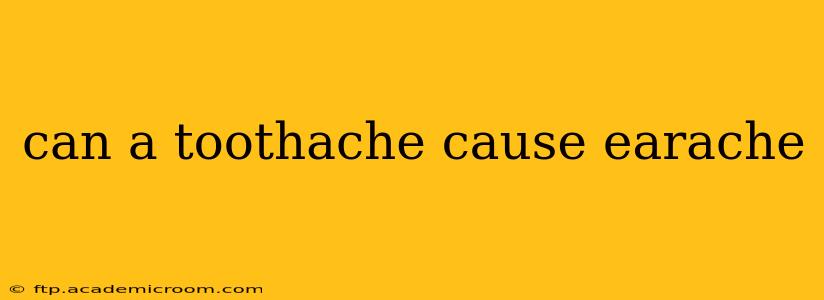A toothache and an earache might seem unrelated, but they can be surprisingly connected. The proximity of your teeth and ears, along with the intricate network of nerves and tissues in your head, means that pain from one area can easily radiate to another. This article will explore the reasons why a toothache can cause an earache, and what you should do if you experience this dual discomfort.
Why Does a Toothache Sometimes Feel Like an Earache?
The referral of pain, also known as referred pain, is the key to understanding this connection. Your upper teeth share a close anatomical relationship with your ears. Specifically, the trigeminal nerve (cranial nerve V) and the glossopharyngeal nerve (cranial nerve IX) innervate both the teeth and the ear. When a tooth is infected or inflamed, the nerve signals sent to the brain can be misinterpreted as originating from the ear, even though the problem's source lies in the teeth. This is why pain from an upper molar can easily be felt in the ear.
What Kind of Tooth Problems Can Cause Ear Pain?
Several dental issues can trigger this referred pain:
- Infected Tooth: An abscess (a pus-filled pocket) at the root of a tooth is a common culprit. The inflammation and pressure build-up can radiate pain to the ear.
- Impacted Wisdom Tooth: A wisdom tooth that's partially or fully impacted (unable to erupt properly) can cause inflammation and infection, leading to ear pain.
- Abscessed Gum Tissue (Periodontal Abscess): Severe gum infections can similarly cause referred pain to the ear, due to the proximity of the gums and the intricate nerve network in the jaw.
- Severe Tooth Decay (Cavities): Extensive decay that reaches the tooth's pulp (the inner soft tissue containing nerves and blood vessels) can cause inflammation and substantial pain, some of which may be perceived in the ear.
- TMJ Disorders: Temporomandibular joint (TMJ) disorders, affecting the jaw joint, can sometimes cause pain that is felt in both the jaw and the ear, and might be misinterpreted as a toothache-related earache.
How Can I Tell if My Earache is Caused by a Toothache?
Differentiating between an ear infection and a toothache-related earache can be challenging. However, some clues can help:
- Location of Pain: While the pain might feel like it's in your ear, try to pinpoint its origin. Does it seem to originate deeper, closer to your jaw and teeth?
- Pain When Chewing or Biting: Pain exacerbated by chewing or biting strongly suggests a dental origin.
- Sensitivity to Cold or Hot: If the area around the suspected tooth is sensitive to temperature changes, a dental problem is more likely.
- Jaw Pain or Swelling: Accompanying jaw pain or swelling points to a dental or TMJ issue.
What Should I Do if I Have a Toothache and an Earache?
If you are experiencing both a toothache and an earache, it's crucial to see a dentist as soon as possible. Delaying treatment can lead to serious complications, including the spread of infection. Your dentist can diagnose the underlying problem and recommend the appropriate treatment, which may include:
- Root Canal: For an infected tooth.
- Extraction: If the tooth is severely damaged or infected.
- Antibiotics: To combat infection.
- Pain Medication: To alleviate discomfort.
- Referral to an ENT: In some cases, your dentist may refer you to an ear, nose, and throat (ENT) specialist to rule out any actual ear infection.
Do not attempt to self-treat; seek professional dental care for an accurate diagnosis and effective treatment plan. Ignoring the problem will only worsen the condition and potentially lead to more severe complications.
Can Other Dental Problems Cause Ear Pain?
Yes, other dental issues besides those explicitly mentioned can cause referred pain to the ear. Any significant inflammation or infection in the oral cavity, including gum disease, abscesses, or impacted teeth (other than wisdom teeth), can potentially cause the pain to radiate to the ear.
When Should I See a Doctor for an Earache?
While a toothache can often be the culprit behind an earache, it's always important to rule out a true ear infection. Seek medical attention if your earache is accompanied by:
- Fever
- Hearing Loss
- Drainage from the Ear
- Severe Pain
- Dizziness
Remember, early diagnosis and treatment are key to resolving both toothaches and earaches effectively. Don't hesitate to contact your dentist or doctor if you are experiencing persistent pain.
